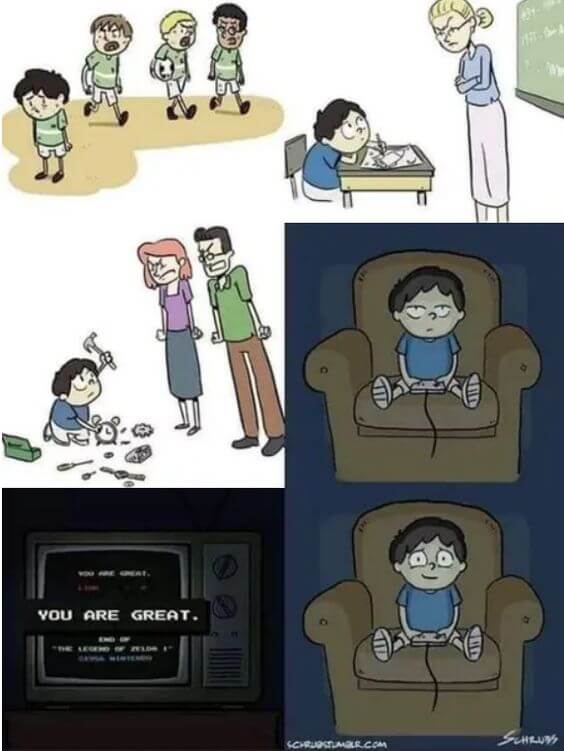I grew up with the opinion that games are not valuable entertainment, teach nothing and are full of violence, and that playing games is a mindless and unproductive activity. All of these statements are untrue, although sometimes they still persist in various circles.
Games, like any tool, have positive and negative sides, depending on how we use it. Instead of blaming inanimate things, let’s learn to use them wisely so that they have a positive, not negative, impact on our lives.
In the following article you will find some facts, confirmed by research, that relate to the positive aspects of gaming.
Games can be a real springboard
When in the 19th century. the first factories and shift systems were established, an artificial division of the day into three parts of 8 hours each was made. They were to be used for sleep, work and rest.
Unfortunately, a lot of people fail to rest and relax effectively. Even if we set aside time for ourselves to relax, we feel that it should be focused on an activity and bring benefits.
We often forget that it’s worth it to actually relax and do what you like to unwind reality. One such hobby could be gaming.
What can the games teach?
Games are a vehicle for culture. They can convey truths about the world, life, history or culture.
I will cite several games as examples:
- The Witcher – tells about Slavic culture, weaves in elements of legends, legends or Polish literature. It also shows moral dilemmas or social inequality.
- The war of mine – shows the lives and dilemmas of civilians during wartime conflict (this item is included as supplementary reading in the high school core curriculum).
- Wolfenstein – refers to the history of World War II and the views of the Nazis.
- Red Dead Redemption 2 – depicts the hardship of life in the Wild West and various aspects of that era.
- Farming Simulator – the player takes on the role of a farmer who manages his crops. All “simulator” type games teach skills based on real occupations.
- Assasin Creed – the different parts present snippets of different places in different eras, such as: Venice during the Renaissance, or Egypt in antiquity.
Some of them are, of course, items for older audiences. However, I took the liberty of selecting such examples, because there is a good chance that the name itself has escaped your ears.
Games teach skills in practice rather than theory, which can make the player faster and more involved in the learning process. Games also help develop various skills.
According to the study, players have:
- better eye-hand coordination,
- shorter response time,
- more developed spatial imagination,
- developed attentiveness,
- greater focus on the task at hand,
- Improving short-term memory performance,
- greater ability to predict the movement of the stimulus,
- Strategic thinking skills,
- The ability to switch between tasks and prioritize tasks more efficiently,
- better ability to work in teams,
- They also train empathy by getting into character.
Games teach that things don’t always work out perfectly. Mistakes as well as failures happen. This is the natural order of things, from which we can draw new experiences, learn lessons, adjust our own actions and keep trying until we finally succeed.
Allowing yourself to make mistakes and continuing to work on them is certainly part of the competence of the future.
Do games affect the development of aggression?
Violence was present in movies and books even before it reached games, but it is in this form that it seems to offend the most. Why? Probably by the possibility of interaction. It is in games that we have decision-making power over the actions of the protagonist.
In addition, there is a large group of games with a first-person view, which is supposed to bring us closer to the perspective of the protagonist (avatar). It’s also impossible to forget a whole host of games that actually contain this violence (in different ways and intensities) in them.
So do games contribute in any way to the development of aggression?
There is no scientifically validated evidence for this. One meta-analysis of studies shows that there is only a 2% effect of exposure to violent content on building aggression in players. It means that the basis of aggression should be sought more in other areas of functioning, including the environment or personality of the person.
The question of causality is also worth raising. On today’s shelves we can find many games with varying doses of violent behavior. It cannot be ruled out that people who already have aggression problems will reach for certain suggestions more often than those without such problems. This, on the one hand, can contribute to increased disregulation or less empathy, but on the other hand, it can also allow people to discharge their emotions in ways that are not intrusive to others.
A digital environment can support
Browsing through social media, I came across such a meme that illustrates well what I am about to talk about, which is appreciation.

Thousands of people (with various reuploads) felt the meme referred to their lives. When they weren’t doing well in school, peer or parental relationships weren’t the best, the games provided a sense of security and appreciation for their efforts.
Gaining more levels allowed to increase one’s self-esteem and confidence. What’s more, the games allowed people with similar interests to find each other and form deep friendships.
Skills they couldn’t demonstrate at school, or relationships they couldn’t acquire in real life, came easily to them in the digital environment.
Simply seeking positive values, such as in the form of game interaction, is a healthy approach. Finding them will be uplifting and can positively affect a person’s development or life.
What’s more, the values experienced can be transferred to reality or dared to be themselves. The positive impact on the well-being of players is also confirmed by research.
Knowla Box is a smart play
Knowl’s Educational Universe Planets contains activities that support the acquisition of knowledge while providing a ton of fun. Many of the applications were prepared with a special educational purpose, so the content aspect was important in their creation.
The level of fun varies depending on the activity. Of particular note are Planet Fruu, Planet Hopsa and Knowli FUN Packages.
Knowla Box also allows you to exercise your whole body: throwing balls at a target, running or bending down to get more balls. Up to a dozen people can take part in the games at a time.
Throw the ball at the Knowla Box’s projected image and start a new game with us!
Sources:
- https://www.frontiersin.org/articles/10.3389/fpsyg.2013.00629/full
- https://www.nature.com/articles/nrn3135
- https://journals.sagepub.com/doi/abs/10.1177/1745691619863807?journalCode=ppsa
- https://ejournal.lucp.net/index.php/mjn/article/view/thepositiveeffectof
- https://journals.sagepub.com/doi/abs/10.1177/1745691619863807?journalCode=ppsa
- https://link.springer.com/article/10.1007/s11126-007-9056-9


